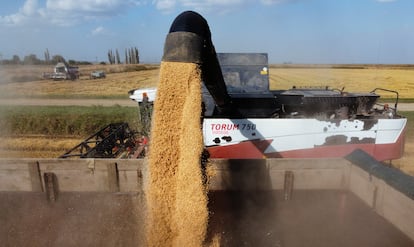Russia turns to bartering
The country’s agricultural companies explore trading chickpeas for rice and mandarin oranges with other Asian countries to get around international sanctions. The Kremlin has put together a guide for such transactions and is confident that bartering ‘will increase competitiveness’


International bank sanctions have pushed Russian businesses to reinvent themselves. Bartering, a practice dating back to the Neolithic era and employed during past economic crises, has emerged as an alternative for the country’s firms as they try to circumvent sanctions imposed by the West over the invasion of Ukraine. The Kremlin, which has failed in its attempt to replace imports with its “made in Russia” project, has even produced a guide for these rudimentary transactions.
One of the country’s largest agricultural companies, Astarta Agrotrading, signed two important agreements with Pakistan in October. “We will exchange chickpeas for rice with one company and chickpeas for mandarins with another,” the owner of the holding, Stanislav Neveinitsyn, told Russian news agency Interfax.
The announcement marks the first major test of this kind of transaction. The fact that the exchange will be carried out “by weight” and future customs taxes are among the issues that have yet to be resolved. The chickpea-for-rice trade was set at 10,000 tons, but there are some kinks to work out in the second agreement before trades begin in December. “I still cannot say anything about the volume of mandarins because we are going to test them, in the literal sense of the word,” Neveinitsyn said.
In August, several Russian and Chinese companies discussed the possibility of bartering, according to Reuters, although no major exchange has been formalized so far.
Russian business sources have confirmed to EL PAÍS that delays and blockages in payments via Chinese banks continue. Russian President Vladimir Putin discussed these problems with Chinese President Xi Jinping on Putin’s trip to China in May, but Chinese entities continue to adhere to U.S. sanctions. According to these same sources, the only option open to Russian businesses is “jumping” from one regional Chinese bank to another when international transactions are declined.
Astarta Agrotrading’s agreements have revitalized a Kremlin initiative that seemed to have been fading out: the Navigator for Barter in Foreign Trade. The Ministry of Economic Development launched the guide in the spring to guide companies through regulation compliance while bartering. In addition, it includes various contract formats and a protocol for determining the value of goods and services exchanged.
“This will improve the competitiveness of Russian companies on the international stage,” said Veronika Nikishina, general director of the Russian Export Center. Soon after the publication of the guide, the head of the Ministry, Andrey Belousov, was chosen by Putin as the new Minister of Defense.
“Bartering is especially useful in times of volatility and monetary restrictions […] it bolsters mutual trust […] and its offerings are more attractive. Businesses can reduce the cost of acquiring necessary goods and services and it allows them to offer more competitive prices,” the Russian government’s pamphlet states.
But bartering also raises certain concerns. For one, it could make it easier to evade customs taxes by establishing product value with subjective criterion. Secondly, Russian firms remain dependent on foreign currency inflows to be able to import machinery and raw materials. “We need money for our exports, not mandarins,” Arkady Zlochevsky, president of the Russian Grain Union, told The Moscow Times.
In addition to its recommendations that businesses agree beforehand on how products will be packed and that they study what custom rate they will pay so as not to run into any surprises later on, the guide includes a brief section that describes the calculation of coefficients for estimating product value.
Bartering is particularly focused on food, a sector in which Russia has managed to rely on its own production more or less successfully since 2014, when Moscow imposed restrictions on imports of European agricultural products in response to sanctions over its illegal annexation of Crimea.
Since Russia initiated its war against Ukraine, the Kremlin has improvised a series of measures to evade international sanctions. In addition to bartering, it has legalized some previously contraband products, which Moscow euphemistically refers to as “parallel imports.” That initiative, which was approved in 2022, legalized the purchase of foreign products without the consent of their manufacturers.
Sign up for our weekly newsletter to get more English-language news coverage from EL PAÍS USA Edition
Tu suscripción se está usando en otro dispositivo
¿Quieres añadir otro usuario a tu suscripción?
Si continúas leyendo en este dispositivo, no se podrá leer en el otro.
FlechaTu suscripción se está usando en otro dispositivo y solo puedes acceder a EL PAÍS desde un dispositivo a la vez.
Si quieres compartir tu cuenta, cambia tu suscripción a la modalidad Premium, así podrás añadir otro usuario. Cada uno accederá con su propia cuenta de email, lo que os permitirá personalizar vuestra experiencia en EL PAÍS.
¿Tienes una suscripción de empresa? Accede aquí para contratar más cuentas.
En el caso de no saber quién está usando tu cuenta, te recomendamos cambiar tu contraseña aquí.
Si decides continuar compartiendo tu cuenta, este mensaje se mostrará en tu dispositivo y en el de la otra persona que está usando tu cuenta de forma indefinida, afectando a tu experiencia de lectura. Puedes consultar aquí los términos y condiciones de la suscripción digital.








































